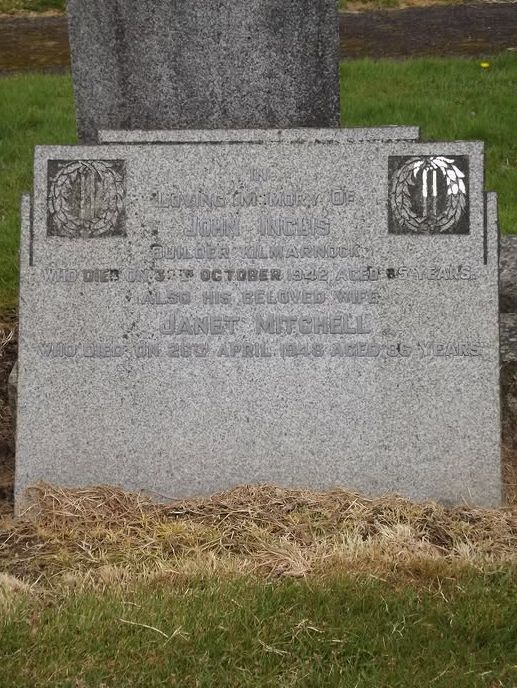John Inglis
If anyone might be considered The Father-Figure of Killy football then John Inglis would be high up the list. He was not quite there right at the beginning the founding of Kilmarnock F.C. in 1869, he was twelve, nor in 1873, when the game began to explode in Scotland. But he took to it quickly and from 1878 was between the sticks, for he was a goalkeeper, for the town's other pioneering team, Kilmarnock Athletic, and also stayed, as a hub, almost a focal point, in the part of town that was from his time onward to produce a stream of footballing talent. In fact it was the mining of much of that initial talent by clubs in England that was to see the demise of the club he had served and in the year after the achievement of both his greatest on-field success and retirement from the game, a demise that was to leave local, senior football to what we now know as the Rugby Park club.
John Inglis was born in 1857 the son of a miner originally from Sanquhar in Dumfries and mother from Irvine. He grew up in the thankfully long-gone miners' rows of the Dykehead Colliery just to the east of Hurlford. But he did not go down the pit himself but became a stone-mason, moving into Kilmarnock for work. At twenty he was playing for Athletic, his only club certainly as an amateur to start with and probably throughout his six seasons there.
It was to be a period of great flux, at the forefront of which Athletic in particular would quickly find itself and for two reasons. First it had almost immediate success, winning the Ayrshire Cup in 1879, repeating the win in 1883. Second, in achieving that success its strength had been in attracting a flow of young players drawn from the town's southern working-class district, players for whom football would not only be a past-time but become for some a way out. As illustration two Kilmarnock Athletic players went on to be internationals but only one for Scotland. Inglis was he, in 1884, one cap. The other was John Goodall, Kilmarnock-raised by a widowed and then remarried, local mother but the son of a Scots soldier who served in London and Northern Ireland. Thus John, born in the former was, given the selection criteria of the time, therefore "English" and very quickly selected by England, whilst brother, Archie, on the same basis being eventually selected for Ireland. But several others were also to go South and like the Goodalls very young, often just twenty-one but able therefore to make up their own minds and attracted by the potential of earning from football twice that from the mill or the pit. Indeed, such was the number in the three seasons from 1883 when Scottish recruits to English clubs increased six-fold with a high proportion coming from the Ayrshire town that Athletic more or less ran out of players and in 1885 folded, and Killy itself and even Hurlford must also have struggled somewhat.
Whether Inglis was involved in what was something of a recruitment frenzy is unlikely but he lived in that same part of town and played alongside several of those who went so could not have been unaware. He might even have been tempted himself.

However, by 1883 he was already twenty-six and that same year would marry. His wife was local girl, Janet Mitchell. And by 1885 their eldest child had been born, the first of four, two girls and two boys. Moreover his stone-masonry would expand into building and business seems to have been good. Indeed, judging by the successive houses the family would live in over the next three decades, it would remain just so until retirement, after which he continued to stay in the town until his passing in 1942 at the age of eighty-five. Janet would die in 1948. He is buried in Kilmarnock Cemetery, a life well-met.
Birth Locator:
1857 - Dykehead Colliery, by Hurlford, Ayrshire
Residence Locations:
1861-71 - Dykehead Row, by Hurlford, Ayrshire
1883 - 10, Kirktonholm St., Kilmarnock
1891 - 4, Paxton St., Kilmarnock
1901 - 37, Woodstock St, Kilmarnock
1911-42 - 18, Howard Park Drive, Kilmarnock
Death Locator:
1942 - 18, Howard Park Drive, Kilmarnock
Grave Locator:
Kilmarnock Cemetery, Kilmarnock
Back to the Killy Trail
or the SFHG Home page